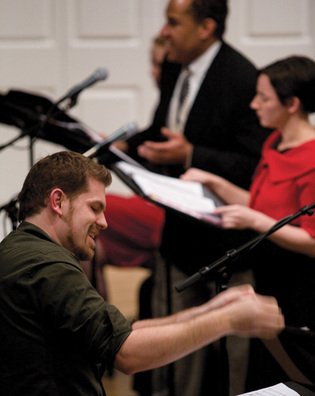 loading
loading
Arts & CultureLyrics ripped from the headlinesHurricane Katrina is set to music.  Julie BrownTed Hearne ’08MusM (foreground) conducts a section of Katrina Ballads at Sprague Hall, featuring singers Anthony Turner and Mellissa Hughes ’08MusM. View full imageAs the musicians tune up before the March 5 concert at New Haven's Trinity Lutheran Church, the electric guitarist playfully pretends to whack the bassist next to him with his instrument. A red-haired pianist in a corduroy jacket is reaching inside the piano, plunking and thumping the wires by hand -- as he will do moments later during the performance. On the stage are some instruments you don't often find in a small ensemble: a French horn, a vibraphone, and -- critically -- a man working the knobs of a sound board to make sure some sounds don't wash away the others. This is a melting pot, all right. What the audience doesn't know yet is the boiling point. Katrina Ballads is a ten-part impression, by School of Music composition student Ted Hearne, of the devastation of New Orleans and the uncomfortable social truths it uncovered. The prelude starts with vaguely connected, increasingly upset chords, toots, piano tinklings, and an ominous knocking -- all combining to create more of an imagined cultural calamity than a literal recreation of a flood. A plaintive blues refrain -- "New Orleans is sinking" -- comes into play, with the beauty and theatricality of the opening of Porgy and Bess. In subsequent movements, the musical styles seem to come from everywhere. But the text is all derived from media coverage of New Orleans in the wake of Hurricane Katrina. An operatic baritone intones Biloxi native Hardy Jackson's distress: "My wife, I can't find her body, she gone." Anderson Cooper ’89's apoplectic on-air response to Senator Mary Landrieu -- "Do you get the anger that is out here?" -- peaks with four vocalists joining in, key phrases clipped and repeated like hip-hop samples. Then Hearne, the composer, takes the microphone: he's saved the evisceration of George W. Bush ’68 for himself. Hearne turns Bush's praise of FEMA director Michael Brown ("Brownie, you're doin' a heck of a job") into a punchy, jumpy bout of scat singing, with implications of madness and desperation. Then comes a sort of delusional torch song from Bush's mother, Barbara, taken from her remarks after visiting Katrina evacuees at the Astrodome: "So many of the people in the arena here, you know, were underprivileged anyway, so this is working very well for them." Then hip-hop activist Kanye West gets his say -- "I hate the way they portray us in the media" -- in a stark musical context completely different from his own chart-topping records. After the full 70-minute song cycle was performed at Trinity Lutheran, three sections of the work were played the following night at that month's New Music New Haven concert at Yale's Sprague Hall. Two days later, the ensemble went to New York to perform the entire cycle at Greenwich House. Hearne is shopping a recording of the piece to labels; he hopes to have a CD released by the third anniversary of Hurricane Katrina in September. He also hopes to keep his band together and tour the piece while it's hot. Hearne sees Katrina Ballads as a community-building work about collaboration and diversity. "When I wrote it," he explains, "I knew I needed a sound engineer with it. When you have string instruments playing against trumpets, it makes it more complicated, right? But New Orleans is all about different cultures, many styles of music."
The comment period has expired.
|
|